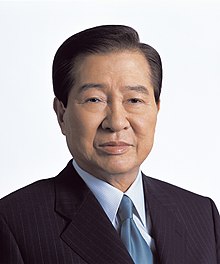Kim Dae-jung
8th President of the Republic of Korea
Kim Dae-jung (6 January 1924 – 18 August 2009) was the 8th President of South Korea from 1998 to 2003, and the 2000 Nobel Peace Prize recipient.

Quotes
edit- I agonize over the suffering that the North Korean people must be experiencing. Every time I'm having a meal and I leave some food, I think about how much this food could do for suffering North Korean children. I really do want to do more to help them, but again, with such negative public opinion in this country, it is very difficult to go ahead with assistance.
- "Interview: President Kim Dae Jung" in TIME Asia (13 September 1999)
- I am confident in my dealings with the chaebol heads. I believe that I have won their trust because, I have asked them for nothing. Unlike past presidents, I did not force them to give me money or political funds. Not a single cent. And, I have not shown favoritism to any particular chaebol. They know that I am fair.
- "Interview: President Kim Dae Jung" in TIME Asia (13 September 1999)
- I believe democracy is the foundation of a healthy economy. Without genuine democracy you cannot have a genuine market economy. And, under the market economy, one must fully open doors to allow free trade and investment.
- "Interview: President Kim Dae Jung" in TIME Asia (13 September 1999)
- Many of the leaders of Asian society have been saying that military dictatorship was the way and democracy was not good for their nation. They concentrated only on economic development. I believe that the fundamental cause of the financial crisis, including here in Korea, is because of placing economic development ahead of democracy.
- "Kim Blasts Regimes That 'Lie'" in The Washington Post (9 January 1999)
- If parents can tell their kids, `Look at Kim Dae Jung: Live upright, put your effort into a good cause and you will be successful,' then I think my life would be very meaningful
- "Kim Blasts Regimes That 'Lie'" in The Washington Post (9 January 1999)
- If we had true democracy in Korea, then the collusive intimacy between business and government and corruption would not have been as great here. And the wealth would not have been allocated to only a few people. Usually the dictatorship or authoritarian style of government lies to people.
- "Kim Blasts Regimes That 'Lie'" in The Washington Post (9 January 1999)
- So when the U.N. made a resolution and asked us to send troops to East Timor, we took this as a responsibility that we must take, and also this was to repay them for their favors. As for the secretary-general's statement that when there is a conflict between human rights and the sovereign right, that sometimes the human rights can override the sovereign right, I think in principle that is right, because before we had nations, we had God-given human rights.
- "Interview with President Kim Dae-jung" in Washington Times (8 November 1999)
- For human rights issues, I think the intervention or support from the outside world is important. But also the effort and sacrifice, or willingness to make sacrifices within, among the people of a nation is important. The Korean democracy -- we had a few decades of sacrifices and tens of people lost their lives because of this concept and hundreds of people were imprisoned because of this concept and we finally gained it. And also the support from the democratic-minded peoples and democratic countries was very important. Of course the prime example of that nation is the United States.
- "Interview with President Kim Dae-jung" in Washington Times (8 November 1999)
- Eventually, North Korea will come out for dialogue. Even though we may hold dialogue at the end, if the provocations are prolonged, then the compensation that we have to give North Korea will become bigger.
- "South Korea's Kim Dae-jung believed North would disarm" in Reuters (17 August 2009)
- In an era of a global economy, we can't survive without foreign investment. We must change our attitude toward foreign investment. We should welcome it.
- "New S. Korea Leader Warns of Hardship" in The Washington Post (18 January 1998)
- In China and Korea, feudalism was brought down and replaced with counties and prefectures before the birth of Christ, and civil service exams to recruit government officials are a thousand years-old. The exercise of power by the king and high officials were monitored by robust systems of auditing. In sum, Asia was rich in the intellectual and institutional traditions that would provide fertile grounds for democracy. What Asia did not have was the organizations of representative democracy. The genius of the west was to create the organizations, a remarkable accomplishment that has greatly advanced the history of humankind.
- "Nobel Lecture, Oslo" (10 December 2000)
Quotes about Kim Dae-jung
edit- Dr Kim Dae-Jung, the one unmistakably great political leader with whom I have had the privilege to talk at length, to whom his country owes far more than it has yet begun to realize, by his singular courage.
- John Dunn, Setting the People Free: The Story of Democracy (2005), "Acknowledgements"